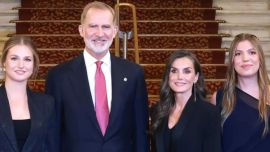Carlos Menem may have been the king of kitsch, a wildly self-indulgent character who liked nothing better than hugging bosomy actresses, hobnobbing with rock stars, playing alongside sporting heroes and collecting glittering artefacts (such as the Ferrari he memorably drove at well over a hundred miles an hour on the road to Pinamar without anyone daring to book him for speeding), but he was also something else. His happy-go-lucky contempt for all rules – including the tacit ones followed by other members of the political establishment who are against anything they fear could inconvenience them – allowed him to mount an all-out assault on the slovenly and obese corporate state perfected by the founder of the Peronist movement he belonged to and which, for over three-quarters of a century, has sat on the country like a gigantic leech that sucks its blood and prevents it from moving ahead.
A heretic by nature – as he made clear by shifting to Roman Catholicism for constitutional reasons and then, it would appear, returning to Islam so he could be buried in the appropriate cemetery – for a time Menem enthusiastically backed Domingo Cavallo’s attempt to restructure the country’s economy after welding the peso to the US dollar. Had Cavallo’s plan gone as well as the Chilean reform programme which had gotten underway several years earlier and was already producing positive results, Argentina would now be a very different country with an economy just as productive as those of southern Europe.
Unfortunately, the country’s establishment failed to take proper advantage of the opportunity given by the period of price stability Menem helped bring about. Like the Greeks decades later – when after swapping the flighty drachma for the earthbound euro they found it easy to borrow huge amounts of money – Argentine politicians and businessmen gleefully piled up debts far bigger than they could possibly repay until, in late 2001, a short-lived Peronist government told creditors to get lost, a decision which was greeted with patriotic jubilation by a large number of parliamentarians who imagined it would free them from all mathematical restraints.
In the wake of the great crash of 2001 and 2002, most politicians and commentators agreed that applying Cavallo’s currency-board contrivance had been a truly dreadful mistake which was always bound to have appalling consequences. They still think this way. What, exactly, do they mean? It would seem they are convinced that, unlike other countries, Argentina simply cannot live with a more or less stable currency and it is terribly foolish to expect her to do so. While in some parts of the world arguments in favour of a certain degree of flexibility make good sense, the results of Argentina’s refusal to put up with what many here regard as excessive rigidity when it comes to the exchange rate could hardly have been worse.
Since inflation took hold midway through the 20th century, the country has slithered down all the relevant socioeconomic league tables. Though “convertibility” in the 1990s and the great commodity boom in the opening decade of the new millennium did offer something of a respite, decline proved accumulative and, unless we are very lucky, spurred on by the coronavirus it could soon accelerate.
Like all political leaders who try to rein in public spending and provide private enterprise with a breathing space, while at it Menem was roundly denounced as a “neoliberal” (a word with strong negative connotations), whose alleged addiction to monetarism made him determined to impoverish honest working folk and reward speculators. After his death last week, few obituaries were written without allusions to the “neoliberal” notions that supposedly inspired him and, it is assumed, brought him, and much of the economy down. Apparently he, or rather Cavallo, should have done the decent thing and, like the rest of them, let the printing press take care of any difficulties that arose by churning out more banknotes. Hereabouts, people really do believe in the “magic money tree” reactionaries talk about when criticising those who think their local government should spend far more than sceptics think wise.
Perhaps Menem never had a clear idea of what he wanted to do other than turn Argentina overnight into a “first-world” country, preferably by presidential decree, and lost interest in the economy after he realised that repairing it would take much more than making inflation go to sleep for a while. Even so, the initial success of the programme he adopted does suggest that, to get out of the hole she has dug herself into, Argentina needs a “caudillo” who, like him, can win the support not just of well-off businessmen and a handful of economic liberals, but also the mostly poor and in many cases semiliterate inhabitants of the Greater Buenos Aires slum belt who, for the foreseeable future, will continue to decide the country’s fate.
Few of these men and women are swayed by ideology. Most vote for candidates they feel value them as human beings and imagine they would find it easy to get along with them. This is why Donald Trump, a free-wheeling vulgarian with quite a lot in common with Menem, whose personal tastes were every bit as garish, is so popular among poorer North Americans despite being – according to the progressives who loathe him – an inordinately self-centred right-wing racist and sexist who cares nothing at all for society’s victims. Most of the people who voted for Menem in 1989 and, after he got the constitution changed so he could remain in office, in 1995, felt closer to him personally than to any of his rivals.
In other words, he had lots of what Max Weber called “charisma,” a gift which allows those who possess it to brush aside mere rationality and do pretty well whatever they please without upsetting their admirers. Since it cannot be made to go away, it will continue to play a key role in politics, especially in countries with powerful presidencies and weak legislative bodies. Unluckily for a great many people, after Menem’s lost his capacity to shape events charisma, or something like it, fell into the hands of a lady who is every bit as narcissistic as was the man from La Rioja when at the top of his game. Yet she is devoted to a radically different set of ideas – instead of seeking to steer Argentina towards the developed part of the world, Cristina Fernández de Kirchner wants to take her in the opposite direction, towards places where irreverent journalists are quickly silenced and all members of the Judiciary treat the powerful with due respect, no matter how many laws they happen to break.























Comments